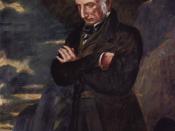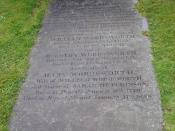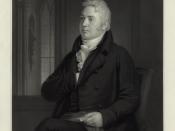William Wordsworth was born on April 7th, 1770, in Cockermouth, Cumberland, England. Young William's parents, John and Ann, died during his boyhood. Raised amid the mountains of Cumberland alongside the River Derwent, Wordworth grew up in a rustic society, and spent a great deal of his time playing outdoors, in what he would later remember as a pure communion with nature. In the early 1790s William lived for a time in France, then in the grip of the violent Revolution; Wordsworth's philosophical sympathies lay with the revolutionaries, but his loyalties lay with England, whose monarchy he was not prepared to see overthrown. While in France, Wordsworth had a long affair with Annette Vallon, with whom he had a daughter, Caroline. A later journey to France to meet Caroline, now a young girl, would inspire the great sonnet "It is a beauteous evening, calm and free."
The chaos and bloodshed of the Reign of Terror in Paris drove William to philosophy books; he was deeply troubled by the rationalism he found in the works of thinkers such as William Godwin, which clashed with his own softer, more emotional understanding of the world.
In despair, he gave up his pursuit of moral questions. In the mid-1790s, however, Wordsworth's increasing sense of anguish forced him to formulate his own understanding of the world and of the human mind in more concrete terms. The theory he produced, and the poetics he invented to embody it, caused a revolution in English literature.
Developed throughout his life, Wordsworth's understanding of the human mind seems simple enough today, what with the advent of psycholanalysis and the general Freudian acceptance of the importance of childhood in the adult psyche. But in Wordsworth's time, in what Seamus Heaney has called "Dr. Johnson's supremely adult eighteenth century,"...


